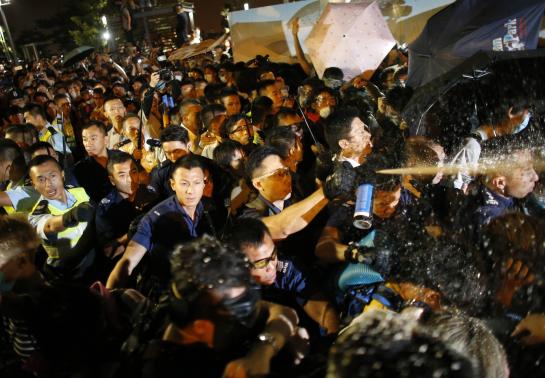
Hong Kong leader Leung Chun-ying sought to defuse tension with pro-democracy protesters on Thursday, saying he hopes the two sides can talk next week, but anger over police violence and continued street scuffles suggest the students are not about to give up. Leung was speaking after more than two weeks of protests that have paralyzed parts of the city and grabbed global headlines amid scenes of violent clashes and tear gas rising between some of the world’s most valuable office buildings. The protesters are demanding free elections for their leader in 2017, but Beijing insists on screening candidates first and Leung reiterated that the government was unwilling to compromise. “We don’t find civil nomination in all Western democracies either,” Leung said when a reporter challenged him on how the talks could progress when he was ruling out any changes to the electoral framework. Chief Secretary Carrie Lam canceled talks with student leaders earlier this month, saying it was impossible to have constructive dialogue. Leung spoke as posters depicting him as a fanged wolf, a gang boss and Hitler stared down from the walls of government headquarters and the Legislative Council building in Admiralty, next to the Central business district, the epicenter of the protest movement against him. In the early hours of Thursday, police used pepper spray to stop protesters from blocking a major road near Leung’s office amid public anger over the police beating and kicking, captured on video, of a protester a day earlier. At police headquarters in the entertainment district of Wan Chai, hundreds of people gathered outside to express outrage at the beating, with dozens queuing to lodge formal complaints. Authorities on Wednesday said the officer involved in the beating of Ken Tsang Kin-chiu, a member of the pro-democracy Civic Party, would be suspended. Footage of the beating has gone viral and injected fresh momentum into the protest that had been flagging after nearly three weeks of demonstrations. Tsang was taken to hospital and activists released photographs showing bruising on his face and body. Several social workers printed a “wanted” poster with color pictures of the police officers they said were responsible. “I think the police have betrayed us Hong Kong citizens,” said Tony Yip, 23, a research assistant at a science museum. “They are using violence against ordinary citizens.” A few hundred protesters were camped out on Thursday around the main protest site in Admiralty and the atmosphere was calm. At its peak, 100,000 protesters had been on the streets, presenting Beijing with one of its biggest political challenges since it crushed pro-democracy demonstrations in and around Tiananmen Square in the Chinese capital in 1989. Those numbers have dwindled significantly. But a hardcore group of demonstrators, mostly students, has kept up the pressure on Hong Kong authorities, who have called the protests illegal. China rules Hong Kong under a “one country, two systems” formula that gives the city wide-ranging autonomy and freedoms not enjoyed in mainland China, with universal suffrage an eventual goal. But Communist Party rulers, fearful that demands for democracy might spread to the mainland, say only candidates vetted by a nominating committee will be able to contest a full city-wide vote to choose the next chief executive in 2017. Leung has said there is “zero chance” Beijing will give in to protesters’ demands, a view shared by most political analysts and many Hong Kong citizens. Hong Kong’s most prominent property tycoon, Li Ka-shing, on Wednesday urged the protesters to go home – in one of the world’s most expensive cities where the vast majority cannot afford their own home. Li, Asia’s richest man and chairman of property developer Cheung Kong (Holdings) Ltd, had made no public comment on the protests but broke his silence to say if Hong Kong’s rule of law broke down it would be the city’s “greatest sorrow”. “I urge everyone not to be agitated,” he said. “I urge everyone not to let today’s passion become the regret for tomorrow. I earnestly request everyone to return to their families.” — Reuters

